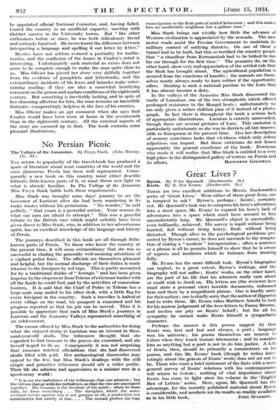No Persian Picnic
MR return to popularity of the travel-book has produced a spate of literature about most countries of the world and the once glamorous Persia has been well represented. Conse- quently a new book on this country must either describe :hitherto little-known parts of it, or must throw new light on what is already familiar. In The Valleys of the Assassins Miss Freya Stark fulfils both these requirements.
Miss Stark was brought some days' journey to see the Governor of Luristan after she had been wandering in its rocky wastes without his permission. " No wonder," he said politely, " that yours is a powerful nation. Your women do what our men are afraid to attempt." This was a graceful tribute to the British race which might suitably have been given direct to Miss Stark, who, in addition to her adventurous spirit, has an excellent knowledge of the language and history of Persia.
The journeys described in this book are all through little- . known parts of Persia. To those who know the country at
. the present time, it will seem extraordinary that she was so successful in eluding the generally well-meaning attentions of a vigilant police force. The officials are themselves pleasant and helpful, but the normal discharge of their duties is made irksome to the foreigner by red tape. This is partly accounted - for by a traditional dislike of " ferengis " and has been given impetus by the elopement from Tehran of a German banker with -a11 the funds he could find, and by the activities of concession- hunters. It is said that the Chief of Police in Tehran has a large-scale map nailed to his Office desk, with a little flag for 'every foreigner in the country. Such a traveller is halted at every village on the road, his passport is examined and his progress reported so that his pin can be moved. Thus it is possible to appreciate that each of Miss Stark's journeys in
Luristan and the Assassins' Valleys represented something of an achievement.
The excuse offered by Miss Stark to the authorities for doing what she enjoyed doing in Luristan was an interest in thou- sand-year-old skulls. The tribesmen thought that she
expected to find treasure in the graves she examined, and she herself hoped to do so. Consequently it was not surprising that rumours reached officialdom that she had discovered skulls filled with gold. Her archaeological discoveries may appeal to the few, but Miss Stark's dealings with the still simple and primitive tribesmen should stir a wider public. Their life she admires and appreciates in a manner rare in a speed-crazy world " It is not the turbulence of the tribesman that one admires ; but the virtues that go with his turbulence, so that the two are associated together. His treasure is the freedom of his spirit - when he loses that, he loses everything . . . The discipline winch the semi- civilized invoke against him is not genuine at all, a production not monstructive but merely of fear. . . . The nomad prefers his in
emancipation to the flesh-pots of settled behaviour ; and this makes him an insufferable neighbour but a gallant man."
Miss Stark brings out vividly how little the advance of Western civilization is appreciated by the nomads. The new motor roads assist the Persian Government to maintain its military control of outlying districts. On one of these a tunnel had to be built, butthis so terrified the country people that " a chauffeur from Kermanshah had to be bribed to run his car through for the first time." The peasants do, on the other hand, show very real appreciation of the settled rule that the Shah has brought about. The agricultural population is secured from the exactions of bandits ; the nomads are them- selves nearly always ready to turn robber if the opportunity offers. Stealing is such a national pastime to the Lurs that it has almost. become a duty.
In the valleys of the Assassins Miss Stark discovered the castle of Lamaisar, one of the two strongholds which offered prolonged resistance to the Mongol hosts ; unfortunately we are only given a rather childish plan of it instead of a photo- graph. In fact there is throughout the book a serious lack of appropriate illustrations. Luristan is entirely- unrecorded, though there are several pictures of Lurs. This omission is particularly unfortunate as she was in districts all but inacces- sible to Europeans at the present time. Also her description of scenery sometimes lacks that vividness which only colour adjectives can impart. But these criticisms do not lessen -appreciably the general excellence of the book. Everyone who reads it will realize that Miss Stark is entitled to a very high place in the distinguished gallery of writers on Persia and
















































 Previous page
Previous page